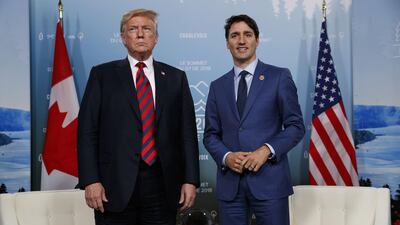US President Donald Trump said on Wednesday that the US-Canada border will be closed to "non-essential" traffic in a bid to stem the coronavirus outbreak.
The shutdown builds on Trump's barring of visitors from most of Europe, China and other parts of the world hit by coronavirus.
In a Twitter post, he did not specify how long the border would be closed, and said details would follow.
The president clarified that the border closure would not stop trade between the two neighbouring countries.
The virus, which originated in the Chinese province of Hubei, has infected 6,510 people in the US, leaving 114 dead.
Canada has recorded 598 cases, eight of which have been fatal.
Ottawa closed the borders to most foreign nationals on Monday but excluded US citizens.
This upset the Pacific province of British Columbia - directly to the north of Washington state, one of the worst-hit spots in the United States - which pushed for American visitors to be banned.
The US and Canadian economies are highly integrated and a strict ban on border crossing would cause major problems for the auto sector as well as the transportation of food and medicines.
Desperate travelers choked European border crossings Wednesday after countries implemented strict controls to try to slow the spread of the coronavirus, which has now infected more than 200,000 people worldwide and killed more than 8,000.
In releasing the new figures, Johns Hopkins University also said more than 82,000 people recovered from the virus, which causes only mild or moderate symptoms such as fever and cough for most people, although severe illness is more likely in the elderly and those with existing health problems.
European leaders have closed borders to nonessential traffic, while leaving many frontiers open to cross-border workers and trucks carrying critical goods like food and medicine. That has led to massive backups of travelers and trucks alike.

